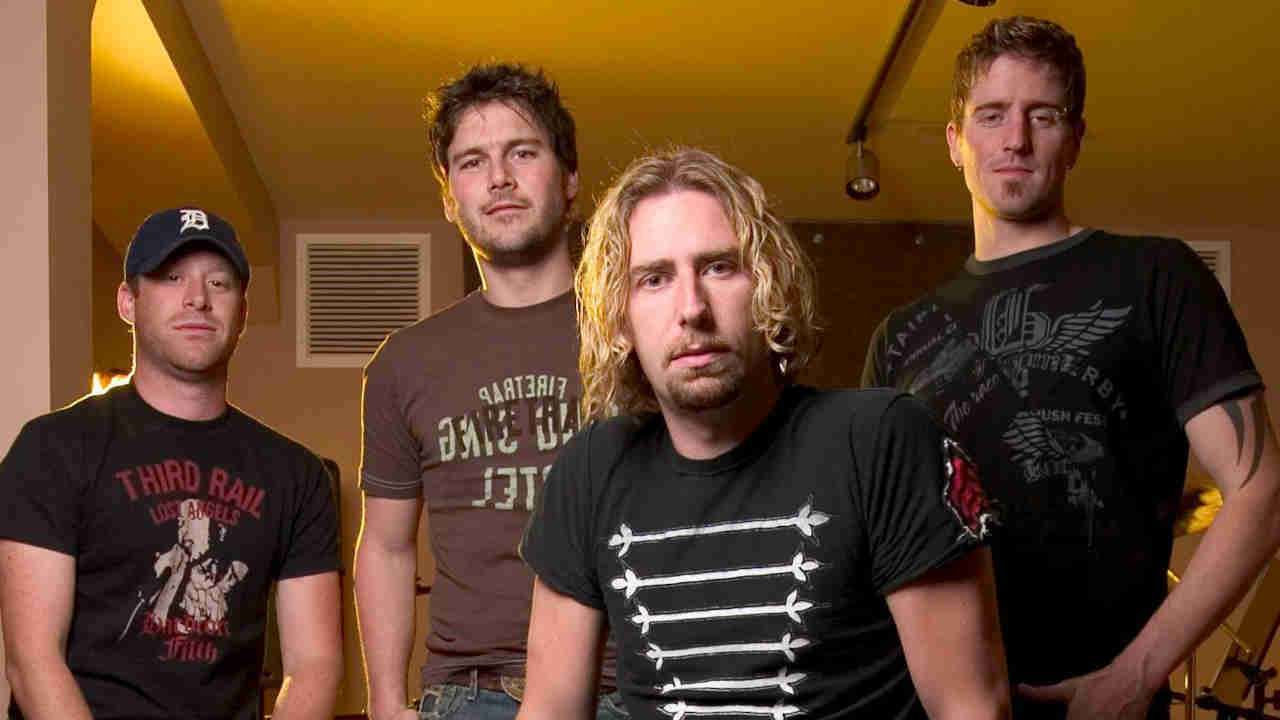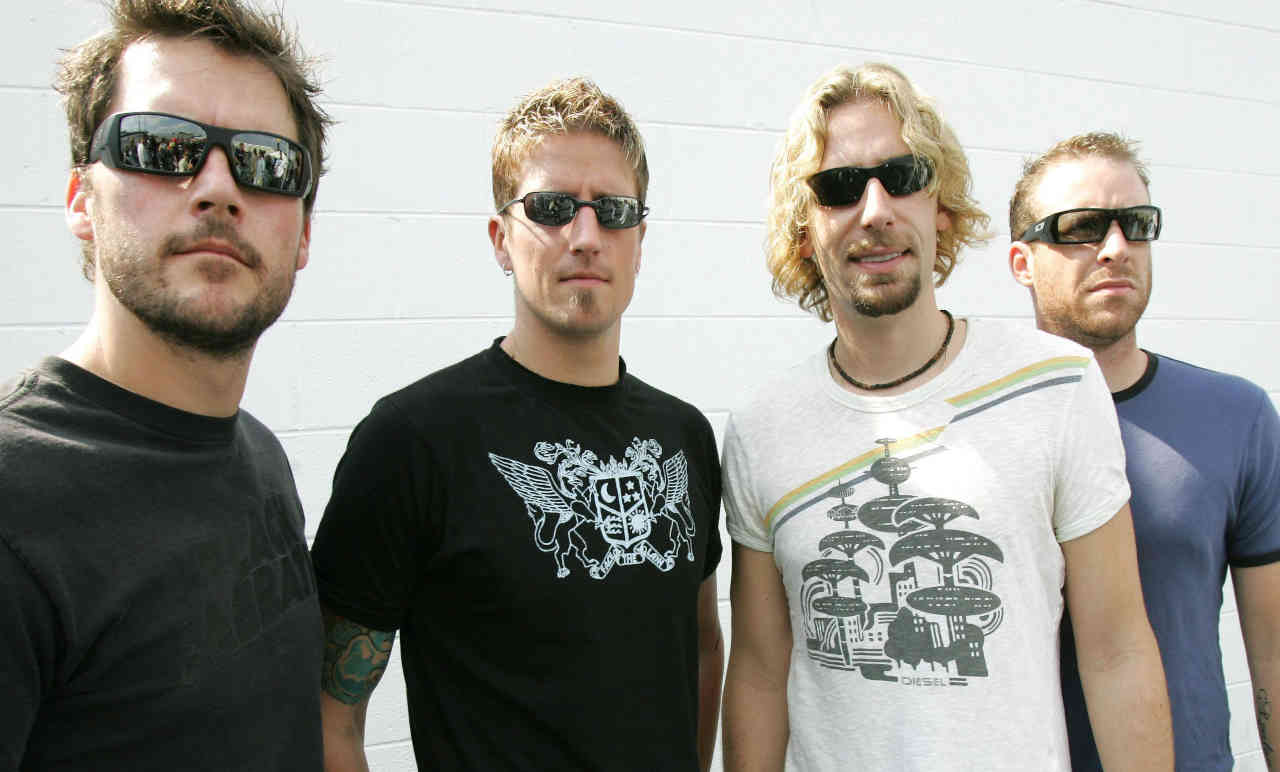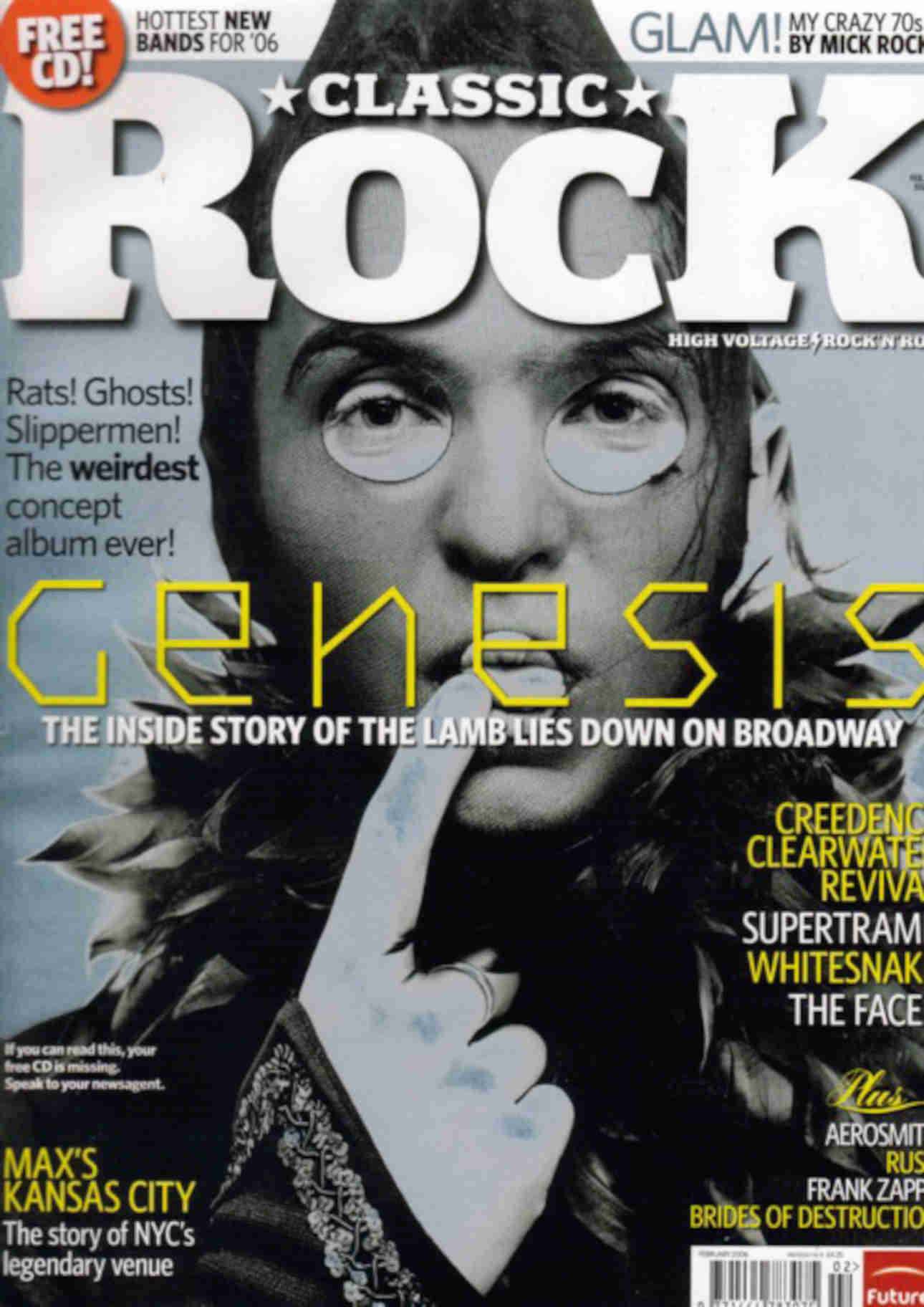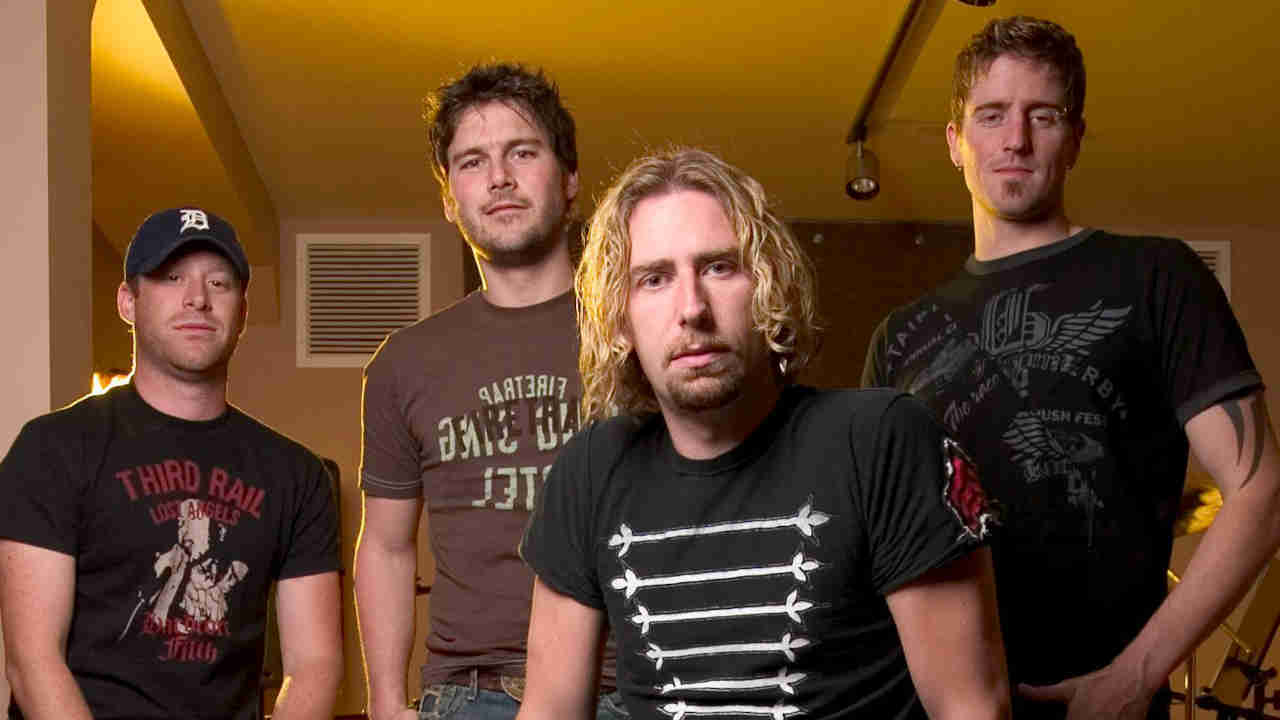“The last time I saw Dimebag Darrell, he hands a bottle of JD over, I take a huge pull off it and throw up. I think I told him I loved him”: Why Nickelback are the rock band all other rock bands secretly wish they were

Few bands are as divisive as Nickelback. The Canadian band may be one of the biggest rock bands of the 21st century, but there’s an army of detractors who take great delight in ripping into the band at any opportunity. But, as Classic Rock found out when we sat down with frontman Chad Kroeger and guitarist Ryan Peake just before the release of 2005’s multi-million selling All The Right Reasons, the digs just bounce off a band are pretty much criticproof.
Chad Kroeger knows how to make an entrance. We’re sitting in a Soho pizza restaurant (a nearby pub has already been rejected as an interview location, due to fears that the smoke might damage Mr Kroeger’s voice), perusing the menu when the Nickelback entourage begins filing in.
First to arrive is a security guard, hulking and suspicious, scanning the restaurant for anyone who might try to lob some garlic bread in the direction of his client. Next through the door is the band’s manager, an anonymous presence who places himself at the far end of the table. Then comes the press officer, fresh from the challenge of transporting a multi-platinum-selling rock band discretely across the London at lunchtime, but satisfied that this particular pizzeria is low-key enough for our interview to proceed.
Finally, just as the arrival of an eyebrow technician seems on the cards, Kroeger and Ryan Peake appear in the doorway. Contrasting with the sunken cheeks and sallow skin of the lunchtime clientele, the Nickelback frontman and his long-serving guitarist look positively glowing. There’s little sign on either face of fallout from their decade on the road, and nothing in their body language to suggest that invisible hand of the record label pushing them along the promotional trail for latest album, All The Right Reasons, has frog-marched them here. On the contrary, enthusiasm fills the air, and there’s a refreshing sense that both men consider themselves lucky to be dining out on record company Roadrunner’s expense account – this isn’t business.
Still, it takes the pair a little while to warm up. Kroeger will not remove his sunglasses for the duration of our interview, and for the first few minutes he sits in silence, his attention seemingly divided between what to eat and whether to trust the journalist in front of him. Then something gives. He decides he’ll have the mozzarella salad followed by the lasagne, and flashes a grin that suggests he doesn’t think we’re here to stitch him up.
Kroeger’s entrance may have been lifted from the first chapter of How To Act Like A Prima Donna Rock Star, but for the rest of the interview he’s charm personified – to the point of eating with one hand so he can hold my dictaphone.

There’s something almost methodical about the way Kroeger has led his band to huge success. They started life as a covers act in the tiny Canadian farming town of Hanna, but the singer realised in the mid-90s that for Nickelback to get their break they would need to relocate.
“It’s impossible to get a band off the ground in Hanna,” he smiles. “That’s why we moved to Vancouver. The best analogy would be, if you were a journalist and you lived in Siberia, do you think you’d have a successful career? I honestly think if Nickelback hadn’t worked out, I’d be in jail, on a charge of grand theft auto or trafficking.”

“And I’d probably be bailing him out of jail,” Ryan Peake chips in, right on the next beat.
“The thing is…” Kroeger considers, “Hanna’s got around 3,000 people and it’s two hours from the nearest city. We were so far from anywhere that we didn’t have a lot of influences. If someone brought an album back to our town, everyone knew about it. You had to go to the city to get records, and so we kinda got exposed to whatever was on the radio, which in my house was country and western. We could play gigs, but they didn’t mean anything. We had to leave,” he says, leaving you in little doubt that they had to.
Nickelback arrived in Vancouver in 1996 with a small amount of original material, and a $4,000 loan from Kroeger’s stepfather. They released the independent album Curb later that year, and promoted it with a tour schedule that verged on the masochistic. For the next four years, the band – completed by Chad’s brother Mike on bass and drummer Ryan Vikedal (later replaced by Daniel Adair) – schlepped around the venues of North America, using downtime to manage their own record distribution and bookings, and building airplay by forcing friends who had escaped Hanna to bombard their local radio stations with requests.
A second self-financed album, The State, was released in 2000, and went on to sell 500,000 copies off the back of another continent-wide offensive. With the industry jaw exposed, Nickelback just needed a good follow-up punch, and they delivered it with 2001’s Silver Side Up. By the time the single How You Remind Me hit No.1 in the US and Canada simultaneously, Nickelback were officially huge – that status later confirmed by the five million sales of 2003’s The Long Road.
Nickelback – Photograph [OFFICIAL VIDEO] – YouTube ![Nickelback - Photograph [OFFICIAL VIDEO] - YouTube](https://img.youtube.com/vi/T3rXdeOvhNE/maxresdefault.jpg)
And yet – how to put this – there was something about Nickelback’s rise to the top of the heap that left a nasty taste in many people’s mouth. Kroeger spent many of his early interviews reminding everyone of his dues-paying roots and the value of songwriting over gimmicks. Sneering reference was made to thd masks and boiler suits of the Canadians’ labelmates Slipknot, while Nickelback’s own music was held up as something from a purer source; the essence of rock’n’roll stripped of the extraneous bullshit. To a large degree, Kroeger’s opinions were justified. But that didn’t stop the knives coming out.
“We get the same rap everywhere we go,” Kroeger sighs. “It’s not just in Britain. We are never going to be confused for critics’ darlings. I think we’re a band that it’s easy to take shots at, because critics only like you when haven’t sold any records. As soon as you’re successful, the press starts policing you.”
When asked whether Nickelback get on with other rock stars, he ponders the question briefly. “Er, if we meet them, yes. If we haven’t met them, for some reason, no. Like, if a band has never met us, we’ll be the first ones they’ll – what do you say over here? – take the piss out of. After a band meets us, they say nothing but good stuff – hopefully.”
Nickelback are famously a very unpretentious band. Have they ever been tempted to get a ‘gimmick’?
“I don’t think we could stick to it,” Kroeger replies. “And I think if you have to have a gimmick to get people to dig your music, then your music is probably not that good in the first place. Just make good music, and people are gonna turn up and drink beer. Beer-drinking is very important for us. We are the people’s beer-drinking band.”
Asked what he thinks when Nickelback play festivals alongside bands like Slipknot, Kroeger fires a perfectly timed reply like a ball from a bat: “We try not to play festivals with Slipknot,” he says, with a comedic edge. “Our fans don’t like each other very much. I actually like some of their music, but I’ll be curious to see if they still want to put on masks and jump around and scream in 10 years. Cos the thing about bands like that – and I’m not trying to trash anybody – is that their fans are going to grow up and look back and go: ‘Hmm…’. Hopefully our fans are gonna grow up and still enjoy our music. Once again, that’s what happens when you have a gimmick – it wears off.”
Would you put Mötley Crüe in that bracket? Their persona has a certain whiff of the artificial.
“I think with Mötley Crüe, they actually did all that,” Ryan Peake counters. “You’ve read The Dirt, right? They actually lived all that.”

“Tommy’s a buddy of mine,” Kroeger says, “and I’ve heard all those stories first-hand. Some of it does get embellished, but then some of it also gets buried, because it’s too unbelievable and nobody wants it to come to the surface.”
Anyone planning a similar book on Nickelback?
“I don’t think we do enough cocaine,” Peake shrugs.
But that’s not to say the band haven’t dabbled in rock star excess. “I was wild, I’ll say it,” Kroeger admits. “Hell yeah. Getting drunk and blowing tons of money. I did build a swimming pool, but it didn’t resemble the shape of a guitar. We’re, like, the year 2000 musicians. We invest!”
“You can wreck whatever you want,” Peake says sagely, “and the record label will pay for it. It’s your money anyway, so it doesn’t matter. We’ve done all that.”
Down to business, then. What themes are you writing about on your album All The Right Reasons?
Kroeger rocks back in his chair. “Hmm, let’s see… There’s blow jobs… more blow jobs. That’s important to a rock’n’roll musician. The ability for a woman to orally satisfy somebody in a rock band – that’s a wonderful quality, isn’t it? Sex crops up a lot on the album. It’s a universal theme.”
He’s not kidding. All The Right Reasons is so sex-crazed that you half expect it to start humping your leg. Animals is a soaring rocker that discusses the dilemma of being caught shagging in a car by your father-in-law. There’s violence, too, especially on Next Contestant.
Nickelback – Rockstar [OFFICIAL VIDEO] – YouTube ![Nickelback - Rockstar [OFFICIAL VIDEO] - YouTube](https://img.youtube.com/vi/DmeUuoxyt_E/maxresdefault.jpg)
The third universal theme on the album is less frivolous: death. Nickelback were drinking partners with Dimebag Darrell until the Pantera guitarist was murdered in 2004, and for All The Right Reasons, they decided to fuse together some Pantera out-takes from the vaults as a tribute. The resulting track is Side Of A Bullet. It’s the one subject on the menu this afternoon that makes Kroeger’s face cloud over.
“The last time I saw Dimebag it was the end of a night out,” he reflects. “I’m sitting in his car, he hands a bottle of JD over, and I take a huge pull off of it, open the door, throw up, wipe my mouth, and send it back over. I hugged him. He told me to be careful on the road; I think I actually told him I loved him. Then he got on the bus. And that was the last time I saw him.”
“We’d actually worked together before, on a cover of [Elton John’s] Saturday Night’s Alright (For Fighting),” Chad continues, “but there wasn’t enough material [to put together another track]. So we called up Vinnie [Paul, Dimebag’s brother and former Pantera drummer] and asked if he could send us some pieces from [Pantera’s] Vulgar Display Of Power and Far Beyond Driven. We wanted to get those signature Dimebag pieces, so the minute he starts playing you know it’s him. And we’re very proud of it.”
Nickelback are due across the road at Virgin Radio, so we wrap things up. Chad clicks off the dictaphone, Ryan cleans his plate, and they get an assurance that Classic Rock won’t slag Nickelback off in the feature that will come out of today. “It really doesn’t matter if you do,” Kroeger grins.
And he’s right. This band is impervious to cynicism. Whatever you think of Nickelback, your opinion doesn’t change the fact that they write music that gives millions of people a laugh, a dance and a respite from real life. And when it comes down to it, aren’t those all the right reasons?
Originally published in Classic Rock issue 89, October 2005


Your tips on building strong relationships with clients are invaluable.
Do you mind if I quote a couple of your articles as long as I provide credit and sources back to your website? My blog site is in the exact same area of interest as yours and my visitors would truly benefit from some of the information you provide here. Please let me know if this ok with you. Thanks a lot!
Hello there, I discovered your blog via Google at the same time as searching for a related subject, your web site got here up, it seems to be good. I have bookmarked it in my google bookmarks.